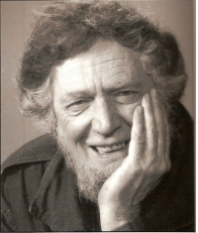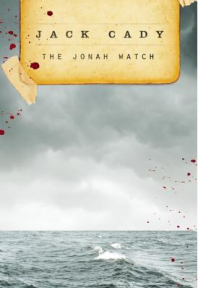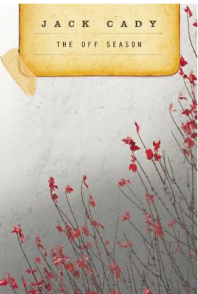
Jack Cady
I’ve been a Northwesterner for quite a while, more than half my life, but Jack Cady got here long before me. He was born in Ohio in 1932, served in the Coast Guard in Maine, conscientiously objected to the war in Korea, graduated from the University of Louisville in Kentucky, drove trucks and did other blue-collar jobs around the country, won awards for his short fiction, and eventually adopted Port Townsend as his home in the middle 1960s. He was for many years thereafter a highly respected writing instructor at the University of Washington and Pacific Lutheran University, and during this period was one of the most highly acclaimed writers in the region. When I mentioned his name the other day to a bookselling oldtimer at another shop, he immediately recalled the days when Cady was one of the very few Northwest writers under contract with one of the big New York publishing houses. A big deal, in other words.
Despite all this, I’d never heard of the guy until this year. My northern exposure was gradual, and by the time I’d put down roots and really started investigating the literature around me, Cady’s heyday was done–almost all of his novels came out in the ‘80s and ‘90s, and he died in 2004. It took the efforts of the good people at Underland Press, who have been re-releasing his work of late, to clue me in. Thanks to them (and to the astute shelf stockers at Watermark Book Company in Anacortes, a place worth missing a ferry for) I finally stumbled across one of his books.
The Jonah Watch caught me first with its cover, a moody seascape ever so tastefully festooned with blood. It promised serious nautical drama with a hint of shock, and it delivered on both counts. The novel takes place almost entirely in the sometimes claustrophobic confines of the Coast Guard cutter Adrian, the crew of which is trying to integrate a new, inexperienced deckhand. The problems faced by the men are at first typical–the tedium of a long voyage, the strain of physical labor, the tension of strong personalities sharing close quarters–but they’re all described with absolutely convincing detail. As I read, safe in my chair on terra firma, I thought I knew what it was to work on the waves, and although I was turning pages in the highest heat of a Pacific summer, I could feel the bitter iciness of the North Atlantic. And then things got reallyinteresting. Sailors are a superstitious bunch, and as the Adrian’s luck turns bad, Cady’s crew starts to believe they’re the victims of malign forces and that their newest seaman is cursed. Whether they’re right or wrong–and the novel leaves that up to the reader–they act on that belief. The denouement is legitimately scary and the whole experience is gripping.
I couldn’t let go of Cady without trying another book, so I picked up a collection of shorter work, Phantoms. It leads off with a bit of non-fiction, an open letter to the IRS in which the author explains why he’s witholding his tax payments. Since I’ve already mentioned Cady’s conscientious objector status, it’s no spoiler to reveal that it was because he didn’t want to support the Vietnam War. He originally delivered the address in open court when various protesters on trial were given an opportunity to explain themselves; when he finished, the room burst into applause and the judge stepped down from the bench to shake his hand. Cady still got dunned for the money, of course. That piece was a highlight, and so were several other stories in the volume. I took a particular fancy to “The Souls of Drowning Mountain,” about a welfare worker assigned to an Appalachian coal mining town, and “The Ghost of Dive Bomber Hill,” in which a long-haul trucker relates some harrowing encounters along the road. These are perhaps the best examples of how good Cady is at capturing the reality of daily life in dialogue and image. He’s especially good on the subject of work, whether it’s done in an office, behind a steering wheel, or in the darkness underground. It all feels so authentic that when something out of the ordinary happens in one of his stories, your belief never wavers.
 As it turned out, I saved the best of Cady for last. The Off Season is a novel set in our neck of the woods, a smallish coastal town called Point Vestal that’s an obvious stand-in for Port Townsend. It’s a quiet sort of place, very image-conscious and frowning on decadent, big-city manners, but what the residents don’t like to admit is that it’s built on shaky foundations. As the narrative says from the start, “Every town has an official history. In Point Vestal, an official history is easy come by, but atrue history is not.” The starchy town founders hid an awful lot of lust and greed under a veneer of Victorian propriety, and the stately homes they left behind are less stable than they look. These sordid origins have to be reckoned with before the residents of Point Vestal can move into the future. This conflict between eras manifests itself via the presence of innumerable ghosts, which seems only natural in a town so haunted by its past. Living or dead, every character has a distinct and engaging personality, and the story is filled with humor, not horror. It reminds me in many ways of Brian Doyle’s wonderful Mink River.
As it turned out, I saved the best of Cady for last. The Off Season is a novel set in our neck of the woods, a smallish coastal town called Point Vestal that’s an obvious stand-in for Port Townsend. It’s a quiet sort of place, very image-conscious and frowning on decadent, big-city manners, but what the residents don’t like to admit is that it’s built on shaky foundations. As the narrative says from the start, “Every town has an official history. In Point Vestal, an official history is easy come by, but atrue history is not.” The starchy town founders hid an awful lot of lust and greed under a veneer of Victorian propriety, and the stately homes they left behind are less stable than they look. These sordid origins have to be reckoned with before the residents of Point Vestal can move into the future. This conflict between eras manifests itself via the presence of innumerable ghosts, which seems only natural in a town so haunted by its past. Living or dead, every character has a distinct and engaging personality, and the story is filled with humor, not horror. It reminds me in many ways of Brian Doyle’s wonderful Mink River.
Both books take a collective look at an entire community, both intermingle the secular with the spiritual, and both cast a sentient animal in a prominent role–Doyle features a talking crow, and Cady includes a cat who can purr in Latin and Chinese, among other languages. Only now, as I’m putting my thoughts about these books together, do I realize how much magic is at work throughout them. Cady is always ready to summon the supernatural, but not to produce cheap thrills. For him, ghosts and miracles, whether light or dark, serve as metaphors for all the unseen forces that affect us at every moment–memory, history, emotion, and so on. Rather than making his fiction more esoteric, his imaginative, inexplicable touches bring the world we know even closer. That’s what good writing can do like nothing else. Cady has several other books waiting in out-of-print limbo; may Underland Press continue to help realize his vision.
—James Crossley, Island Books, Mercer Island, WA
Originally published on the Island Books Message in a Bottle Tumblr


